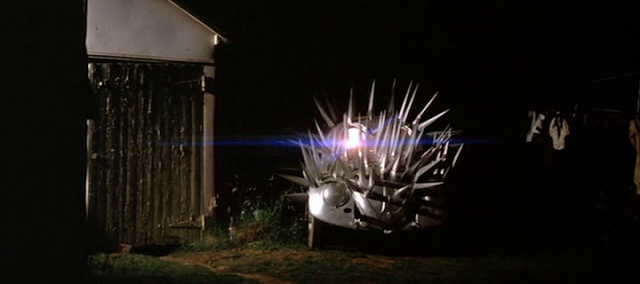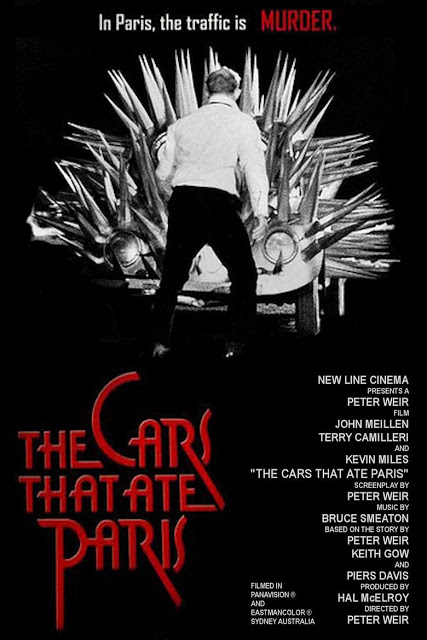 |
| Written by Generoso Fierro |
During the idyllic opening scene of Peter Weir’s debut film, The Cars That Ate Paris, we spy a well-to-do couple who are footloose and fancy free getting into their snappy roadster.
They are wearing the finest vines, and sport that seventies natural-looking hair while smoking fine uppity cigarettes as they take a drive in the scenic Australian countryside, but things don’t stay lovely for long as the couple is hurled off the side of a hill and killed in a gruesome roll out. Crash. You see, our commercial-quality travelers were living the high life that few lived in 1970s Australia, but now they have crossed the town line of Paris – Paris, Australia that is, where cars and the people who drive them become the solution to a community’s financial woes.
Yes, all is not well in the Weir’s genre-defying town of Paris, Australia.
Travelers who dare to broach its gates soon find a “boneshaker” of a road that is complete with “traps” designed by the town elders to guarantee that tourists donate more than a few coins for a picture postcard at the local gas station. There is a process in place for these visitors that is divided into two categories: those who die and those who survive.
Those who die have their smashed up cars taken to the local chop shop to be salvaged for parts that will eventually be made into bizarre post-apocalyptic road rockets to be driven by Paris’ wild and uncontrollable youths. Next the deceased’s clothes, money, and gadgets will be first divvied up by the town’s government, led by their righteous Mayor (John Meillon, who most American audiences will identify as Crocodile Dundee’s dimwitted sidekick, Walt), and whatever remains will be distributed to the remaining common Parisians who use the items as bartering tools for food, gas, etc like a dysfunctional farming community.
Those who live will not only get the aforementioned pilfering of their valuables like their deceased fellow travelers but also will get the special prize of a free lobotomy at the local hospital so that they can turned into various states of “veggie.” Why make the damaged tourists into “veggies” you may ask? To use them as guinea pigs for experimental procedures that the local doctors are dying to try out, since “you can’t do these things in a city hospital,” one doctor explains. You now begin to think of the town of Paris as a Spam factory: There is no waste as they use every single part of the animal.
There is another unofficial use for the living as evidenced by the mayor’s beautiful “adopted” children and a recent arrival, Arthur Waldo (Terry Camilleri), whose brother George is killed when their caravan unsurprisingly goes flying off of one of the town’s many road traps. Arthur, is a heartbreakingly sullen, and seemingly nonthreatening fellow who escaped death with nary a scratch, which makes him eligible to become the makeshift offspring of our jolly mayor. Through his own admission, we find out that Arthur, who is still crushed from his brother’s untimely demise, is also a convicted felon, who years earlier was responsible for vehicular death of an elderly man, so he is not too eager to get behind the wheel of a car again, which is good because no one really makes it out of Paris alive anyway, which appears to be Weir’s gentile nod to a protectionist Australia which barred immigration until the late 1970s. Yes, Arthur is “fixed” to take in the sights and is content to be stay put. Content in a way that would make the denizens of a Yorgos Lanthimos film simply green with envy.
Arthur is given a job at the chop shop/hospital and gets a lot of half answers from the doctors and orderlies as to why the wards are packed with the Monty Pythonesque bandaged (my brain hurts anyone?) mentally disabled “veggies.” Arthur doesn’t particularly care for his new employment as a guardian of the lobotomy farm, but as he is still going into a mad panic of flashbacks whenever he sits behind a wheel, he will stay and accept a new position that was recently created by his father/mayor, that of “town parking supervisor,” which will put the sheepish Arthur right in the cross hairs of the town’s rambunctious and growing swell of young Road Warrior extras who, judging from their western attire, seem to be auditioning for a new Sergio Leone film, and who have more than a few jalopies that Miller would use in subsequent editions of his own post apocalyptic films of the Max variety.
The Town That Ate Paris mostly succeeds both as a comedy and as social commentary throughout even though the last third of the film is more Animal House than Dogtooth in terms of examining societal woes of a then economically challenged Australia. One scene does hint as Weir’s societal focus on a future project: the scene where the mayor’s unflattering aboriginal sculpture is defiantly destroyed by the hands of Paris’ renegade hot rod driving teens. That moment provides the strongest reminder that Weir would eventually create a film that stays on point with its clever attack on contemporary Australian society and its history of the treatment of the Aborigines, 1977’s The Last Wave.
Nonetheless, Weir’s film is quite an impressive debut as it is chock full of wretchedly insane ideas and not too gentile pokes at the ruling class who must confront an ever increasing population of unemployed youth before the big one hits and the elderly are at the mercy of these desperate teens and their soon to be new leader, Lord Humongous.
















































































































